Happening Soon!
Critical Femininities Summer Writing Group
Dates: Thursdays, starting June 30
Time: 1:00pm – 3:30pm EDT
Register: https://yorku.zoom.us/meeting/register/tJEodO6hpzotGtEW3fRiCBTXLVAFsze8ydGq
You will receive a link to join the meeting after registering. Use the same link to join every week.
Bring your writing projects and quandaries to the Critical Femininities summer writing group. This drop-in group is designed to support networking and collaboration while offering 75 minutes of structured writing time using the Pomodoro Method. Hosted by Allison Taylor and Andi Schwartz, each session will begin with introductions and end with time for discussion and questions. Join us to connect with other Critical Femininities scholars, talk about Critical Femininities, and work on your Critical Femininities projects!
Please feel free to email us with any accessibility requirements or questions: cfr-coor@yorku.ca or allitayl@yorku.ca
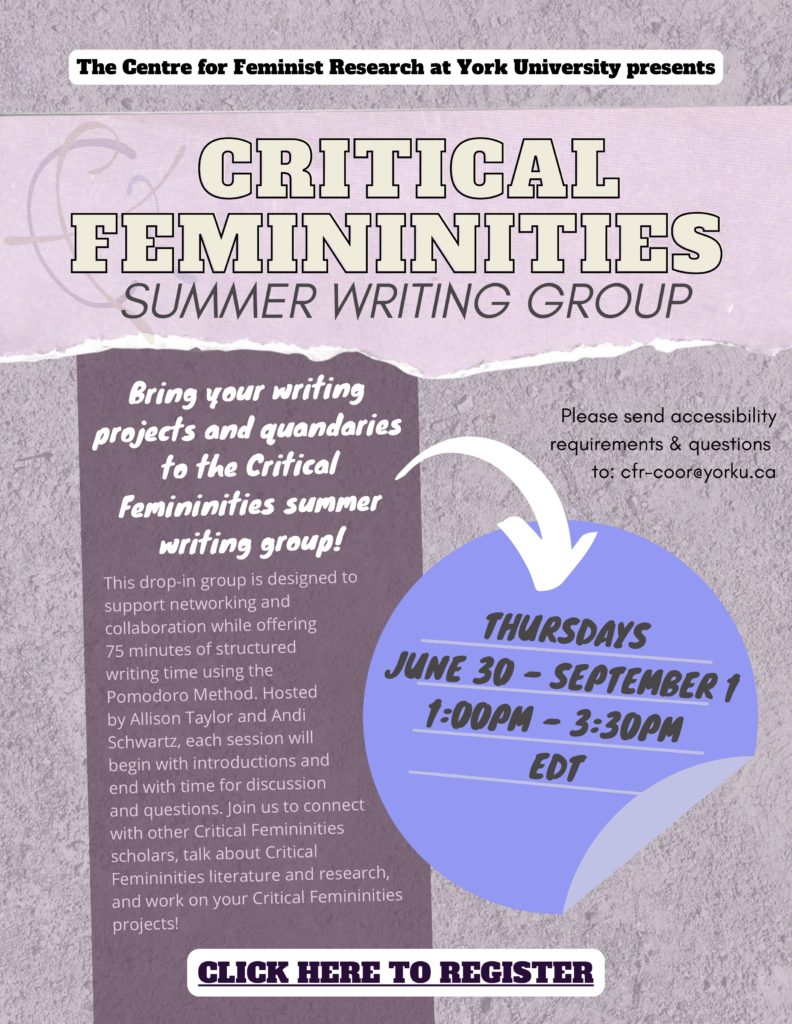
Conference: Feminist Digital Methods (Virtual)
Dates: August 11-13, 2022
Registration: https://www.eventbrite.ca/e/feminist-digital-methods-conference-tickets-350598478487
CFP: https://www.yorku.ca/cfr/wp-content/uploads/sites/255/2022/04/Feminist-Digital-Methods-Call-for-Proposals.pdf
Submission deadline: June 15, 2022
As a result of the COVID-19 pandemic, many feminist scholars have turned to digital methods out of necessity. Others have been using digital methods long before the pandemic. There is a gap between increased demand for digital acuity and decreased ability to gather, troubleshoot, or discuss ideas and projects. Our intention is to fill some of that gap.
We are organizing open access virtual events for the spring and summer of 2022. Virtual events will begin this spring and culminate into a virtual conference 11-13 August 2022. Our primary aim is to foster communities of practice around feminist digital methods by creating intentional space for dialogues, knowledge sharing, workshops, showcases, and presentations. We also aim to engage topics of feminist ethics, digital tools and infrastructure, feminist digital pedagogies, knowledge production & mobilization, social media, and online work, performance, and presence. These events will centre early career scholars, though all feminist digital methods practitioners are welcome to submit a proposal.
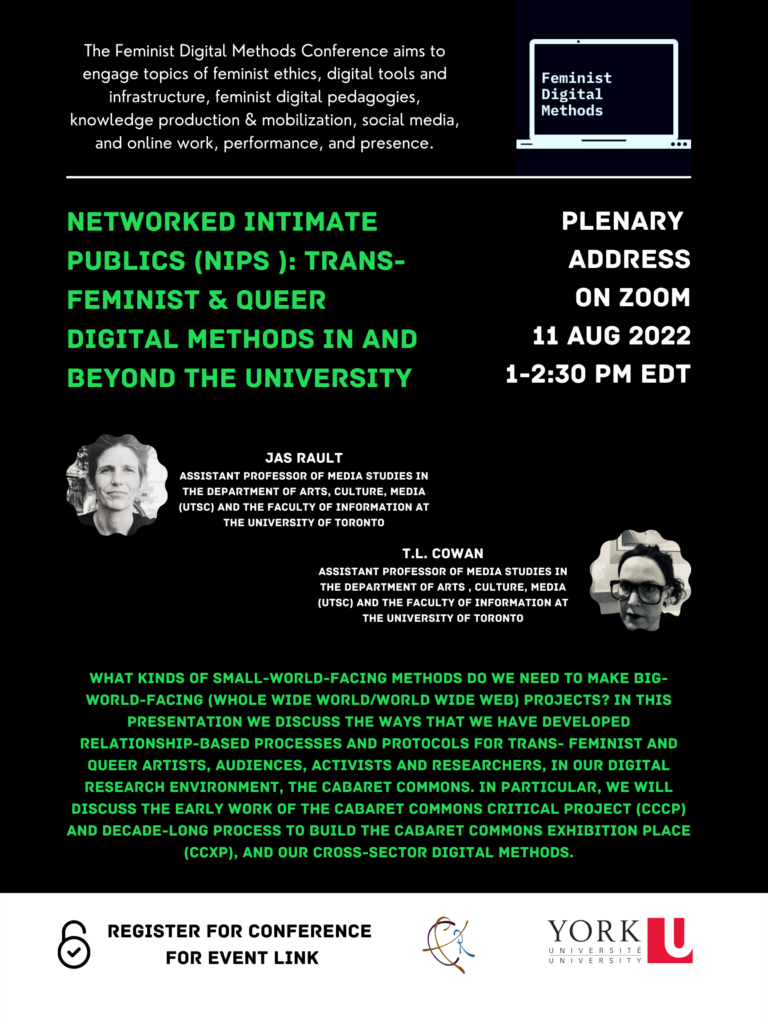
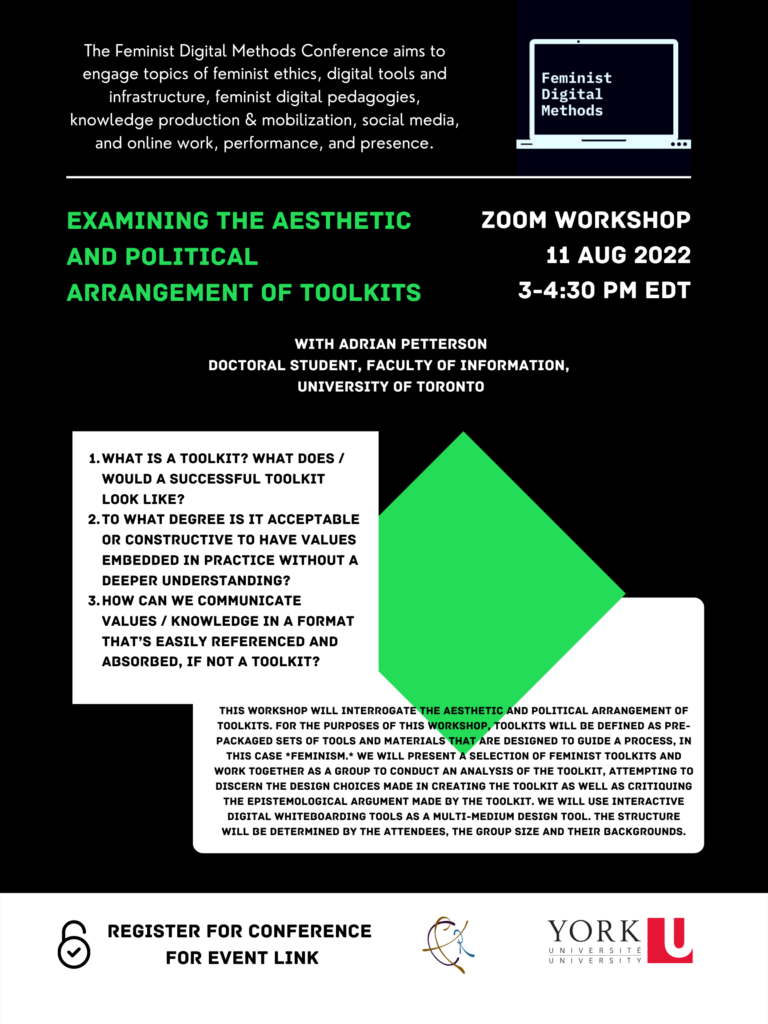

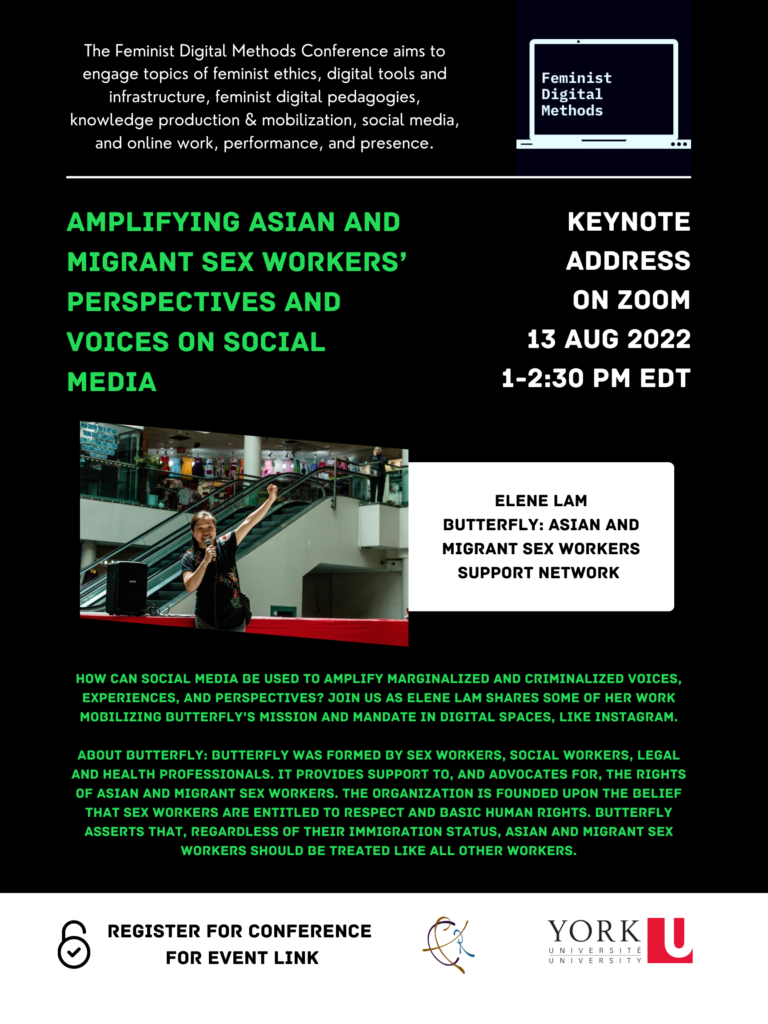
Liminal: The Second Annual Interdisciplinary, Open Access Critical Femininities Conference
Register: https://yorku.zoom.us/meeting/register/tJUvdumppzIiGtYtYVtqxBCSxoTKe6xSQr1W
Dates: August 25-28, 2022
See the CFP here.
To be liminal is to be in between or in transition; on the threshold of the sensory, the liminal may produce both hauntings and longings. We present the concept of “femininity” as liminal or palimpsestic itself (Alexander, 2005), inseparable from the ongoing echos of cisheteropatriarchy, colonization, white supremacy, capitalism, ableism, and fatphobia that interpellated it (Brownmiller, 1984; Bordo, 1993; Davis, 1983; Deliovsky, 2008), as well as animated by the simultaneous reverberations of feminist, Black, Indigenous, racialized, trans, and queer interventions which create more capacious futures for femininity (Lorde, 1984; McCann, 2018; Muñoz 1999; Nash, 2011; Rice, 2009; Shraya, 2018). Julia Serano’s (2008) foundational work on transfemininity reveals femininity’s impermanence and malleability, both socially and scientifically (re)constructed. These critical undertakings permit an understanding of femininity as an embodied site of many assemblages and temporalities, transforming it (as well as gender writ large) from a modality of imperial domination into a place of past-present-future becoming and a practice of transgenerational kinship. How might we understand femininity as nonlinear, transitory, and transformative? How might patriarchal phases of femininity be contested or reclaimed?
This conference will be hosted by the Centre for Feminist Research at York University and held virtually via Zoom. Check out the Call for Papers here and join our listserv or visit our website for updates!
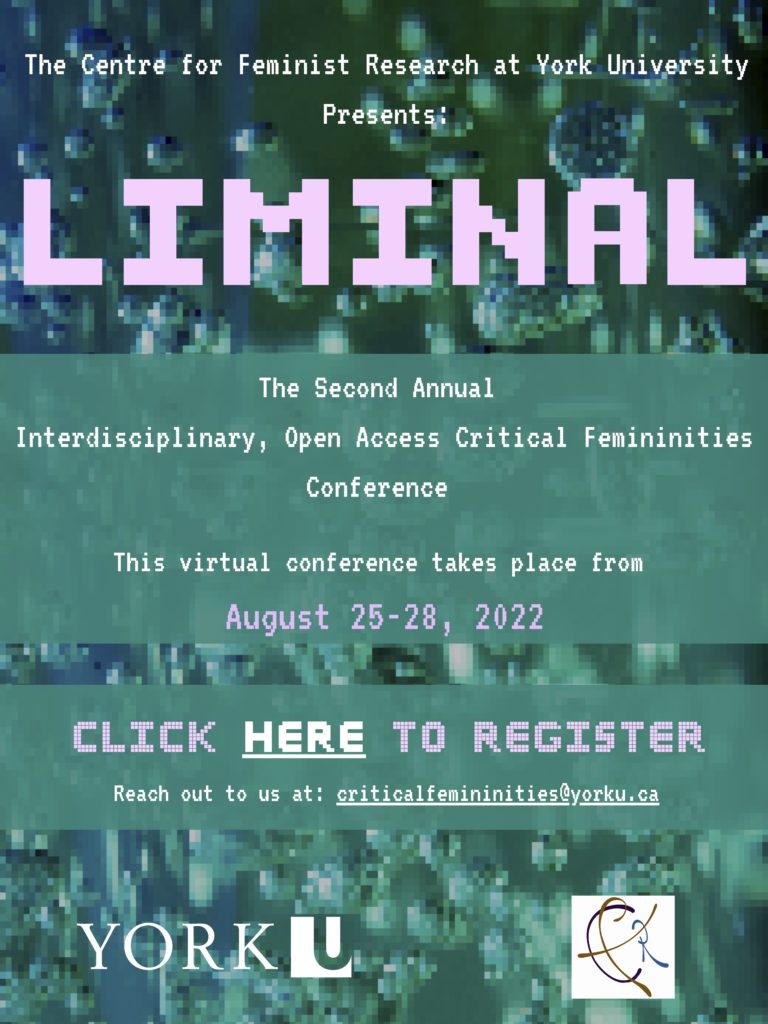
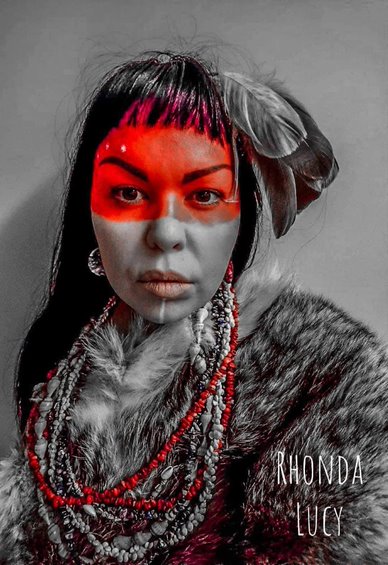
Join the Liminal conference for
“Story Mask”: A Workshop with Rhonda Lucy
Date: Friday, August 26, 2022
Time: 1:00pm – 2:30pm EDT
Register: https://yorku.zoom.us/meeting/register/tJUvdumppzIiGtYtYVtqxBCSxoTKe6xSQr1W
Mask making… the great transition. This workshop will include mask making and techniques to bring pieces of ourselves from the world around us make up the way we see, are seen, or are unseen. The masks we wear both project and protect what is underneath them. Our femininity as an invention of past, present and future, seem to always be in the constant in-between spaces, even as we remember them, and as we share and discover. Using the traditional concepts of the medicine wheel we will create and explore ourselves and the masks we wear. Participants will need to gather objects of any kind to represent your identity, journey, and personal stories. The objects represent each workshop participant’s physical, emotional, spiritual, and intuitive elements of their being.
Supplies:
None of these suggestions are mandatory, this is your own story mask representing your own personal expression. Some ideas for supplies include: a hot glue gun, cold glue, tape, stapler, tassels, cardboard, paper plates, fabric, paints, paint brushes, glitter, beads, rhinestones, feathers, candle wax, kitchen utensils, ribbon, pipe cleaners, flowers, shoelaces, thread, crayons, pastels, coloured pencils etc. The idea is to gather things that are around you, but you can also go purchase supplies before the workshop as well if you so desire.
Rhonda Lucy (she/her) – traditional name, Tsiktsinensawe Yakonkwe, is a filmmaker, costume designer, artist, and a 2-Spirit Haudenosaunee woman of Indigenous ancestry, based in Toronto, Ontario. I am the founder of “The Toronto Indigenous Filmmakers Collective” and “Sun Raven Arts”. I have been working with companies such as Warner Bros. Paramount, Disney, FX, HBO, APTN and CBC and working in costume design and creature creation since 2004. Recently, I was a cohort of the Banff Spark Accelerator World Media Film Fest in June of 2022. I have been honored with a monument in Parkdale by the Block-by-Block Foundation and the Ward Museum for my work in community arts. I have been named “Indigenous Youth Leader of the Year” in 2016 by Inspirit Foundation. I am an accomplished technician (IATSE 873, CAFTCAD, WIFT, and ACCT), an entrepreneur with a background in creative direction, film, live performance, fashion/SPFX, costuming, mask/puppetry, sculpture arts, and writing. I was the recipient of the Netflix ISO apprenticeship sponsorship in 2021 and am a published writer and visual artist awarded 4 literary grants in 2020 for my short story, “Lantern Fishing”. I am an alumnus of the 2018 CBC Indigenous New voices program and was their first student to world premiere their film at imagineNATIVE’s film festival at Bell Tiff Lightbox. I am a designer for the Toronto Community Arts Guild community arts programs and the creation of public artworks, such as monuments and community art pieces, with my projects have toured the country and been used in lectures, films, and plays with educational initiatives throughout Canada.
Join the Liminal conference for
“Brazen Postures, Interstices, and Other Disturbances”
Keynote Address by Anna Camilleri
Date: Sunday, August 28, 2022
Time: 1:00pm – 2:30pm EDT
Register: https://yorku.zoom.us/meeting/register/tJUvdumppzIiGtYtYVtqxBCSxoTKe6xSQr1W
Anna Camilleri is an interdisciplinary artist with a practice rooted in disability justice. Her body of work spans literature, sound, interdisciplinary and collaborative performance works, visual public artworks, and installations. Her book publications, including Brazen Femme: Queering Femininity, co-edited with Chloë Brushwood Rose, have been recognized with distinctions from the LAMBDA Literary Foundation, the Association of Independent Publishers, and the American Library of Congress. Anna is an Intergenerational LGBT Artist Residency alum, University of Toronto (Scarborough) Department of Arts, Media, and Culture artist residency alum, and a Centennial College Theatre Arts and Performance educator (design and producing). Anna is a Toronto Arts Council Cultural Leaders Lab fellow, a member of the Workman Arts advisory, and an artist collaborator with the Creative Users “Laying the Groundwork for a Sustainable Deaf and Disability Arts Future” project. Over the past fifteen years, Anna has provided consultancy and mentorship to equity-building organizations and artists that have gone on to grow high-impact projects and distinguished art practices. Recent works include May I Take Your Arm? (Theatre Passe Muraille 2021 mainstage, NAC’s English Theatre Collaborations Unit, Festival of Live Digital Art 2019 and 2020) and the Countdown Public Art Project, an aesthetic and discursive intervention into gender-based violence (2016 to present). Anna is founding artistic co-director of ReDefine Arts (established in 2005 as Red Dress Productions) based in Toronto, Treaty 13 Territory, with programming hubs and projects across Ontario. ReDefine Arts works within a network of partnerships to create and present interdisciplinary and community grounded performance and public artworks that advance disability justice, collective liberation, and artistic innovation.
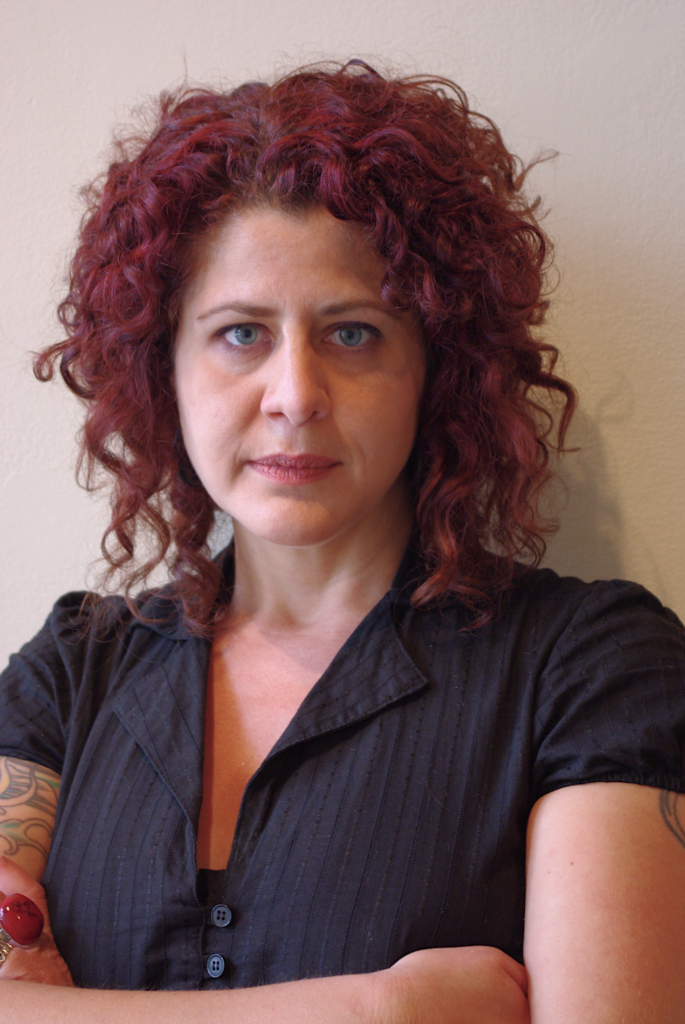
Book Launch: Living with HIV in Post-Crisis Times: Beyond the End Game, edited by Dr. David A.B. Murray (Virtual Event)
Date: TBD
Time: TBD
Registration: TBD
Over the past decade, effective prevention and treatment policies have resulted in global health organizations claiming that the end of the HIV/AIDS crisis is near and that HIV/AIDS is now a chronic but manageable disease. These proclamations have been accompanied by stagnant or decreasing public interest in and financial support for people living with HIV (PLHIV) and the organizations that support them, minimizing significant global disparities in the management and control of the HIV pandemic. The contributors to this edited collection explore how diverse communities of PLHIV and organizations that support them are navigating physical, social, political, and economic challenges during these so-called “post-crisis” times.
Join us to hear from the editor and contributors:
Dr. David A.B. Murray, Department of Anthropology and School of Gender, Sexuality and Women’s Studies, York University.
Dr. Robert Lorway, Institute for Global Public Health, University of Manitoba
Dr. Adia Benton, Department of Anthropology and African Studies Program, Northwestern University
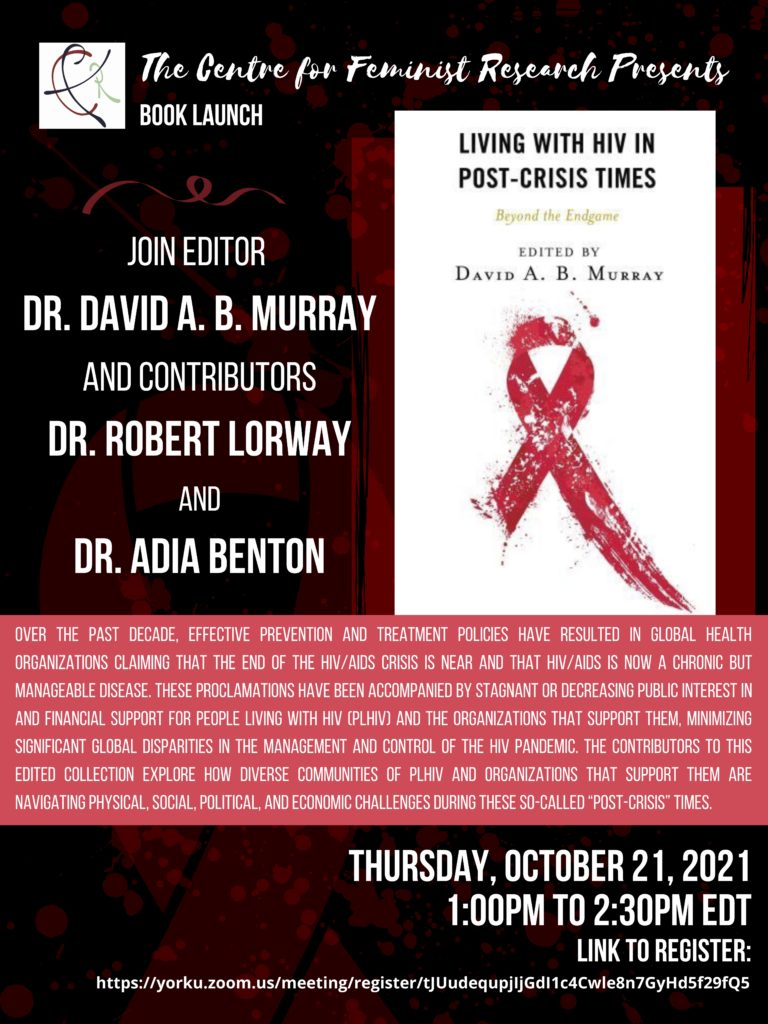
Past Events
Feminist Digital Methods Drop-In Virtual Lab
Dates: June 2, 16 & July 7, 21
Time: 11:00 am EDT
Register: https://yorku.zoom.us/meeting/register/tJwucumhqz4tE9XRmO9cUel3qxOOXOd3gtu2
The Feminist Digital Methods Drop-in Virtual Lab is an informal space to:
- Chat & network with Feminist Digital Methods practitioners and learners
- Discuss Feminist Digital Methods projects and ideas
The idea for this lab emerges from the 26 May 2022 Feminist Digital Methods Informal Chat & Meet n’ Greet.
This Drop-in Virtual Lab is part of the Feminist Digital Methods Events & Conference, which centres early career scholars and aims to foster communities of practice around feminist digital methods by creating intentional space for dialogues, knowledge sharing, workshops, project showcases, and presentations. We also aim to engage topics of feminist ethics, digital tools and infrastructure, feminist digital pedagogies, knowledge mobilization, social media, and online work, performance, and presence.
Feminist Digital Methods: “Pandemic Methods”
Date: June 30, 2022
Time: 10:00am EDT
Register: https://yorku.zoom.us/meeting/register/tJ0kcO-tqj0tHNSRYfkmm-eyFCSLAMMxStRS
The Feminist Digital Methods Events aims to foster communities of practice by creating intentional space for dialogues, knowledge sharing, workshops, showcases, and presentations.
Join us for the first Feminist Digital Methods Presentation Session
“Pandemic Methods” featuring presentations by Library and Archives Canada Senior Archivist Rebecca Murray and Toronto Metropolitan University Post-Doctoral Fellow and York University PhD Candidate, Anum Rafiq
Rebecca Murray, “Women in the War: Indexing Archival Photos during COVID”
The Second World War (SWW) was the first time women officially served in the Canadian military in capacities other than nursing, breaking into roles historically held by men. A multi-year project to index an accession of government photographs from the SWW era in an effort to identify servicewomen began as an effort to help family members identify their ancestors in photographs held at Library and Archives Canada. It has become so much more. The experience of reviewing half a million photographs has challenged and broadened my own historical study and knowledge. Furthermore, the experience of working on this project before and now during a global pandemic has lead to me asking questions about access to and use of primary sources in research. This paper will describe the evolving project workflow, look at preliminary results including how and where women are presented in these photographs, and discuss access to and use of primary sources in research.
Anum Rafiq, “Experiences of Learning About Healthy Relationships Digitally”
This presentation draws from doctoral research on how teachers experienced delivering education on the health and physical education curriculum to youth during the COVID-19 pandemic, expanding the borders of their classrooms into the personal home spaces of students and their parents. Using an institutional ethnography method, Rafiq focuses on how ruling relations organized the learning experiences of youth.
Thinking Violence: Self-Defense, Nonviolence, and Protection
Date: June 9, 2022
Time: 12:00pm – 2:00pm EDT
Register: https://yorku.zoom.us/webinar/register/WN_R22XTIggSOuuxZEwSI4YFQ
You will receive a link to join the meeting after registering.
Social movements in recent years such as #MeToo or Black Lives Matter have forced us to reflect on the relations between state, sexual/sexist and racial violence, as well as how to best resist it. In fact, such movements ask that we revisit the way we think about violence and how we respond to it: Who is entitled to protection and under what conditions? Who has the right to defend oneself, how and with what consequences? What strategies are best suited to stop such violence and prevent its perpetuation? Such collective speak-outs/movements thus bring forth age-old philosophical debates around violence: Is the violence of the oppressed defending oneself the same as the violence of the oppressor? How then can we best define violence and with what ethico-political implications?
Elsa Dorlin’s, Françoise Vergès’ and Judith Butler’s recent work each addresses such issues, revisiting notions of violence, non-violence, protection, and self-defence from a feminist/antiracist perspective. Taken together, these works open up important and timely conversations on how to think violence and resistance. From a “right to peacefulness” for the oppressed (Vergès, 2020), to “martial ethics of the self” for those who do not have a right to self-defence (Dorlin, 2017), and “aggressive non-violence” rooted in social bonds as care for theungrievable (Butler, 2020), these three feminist/antiracist thinkers invite us to imagine a tomorrow away from individualism and fatalist victimisation, within, against and/or beyond violence.
In this webinar, the three authors will discuss together notions of non/violence, self-defence, and protection, followed by a Q&A with the audience. Presentations will be in French and English with French/English translation available. The event will take place on June 9th from 12pm to 2pm.

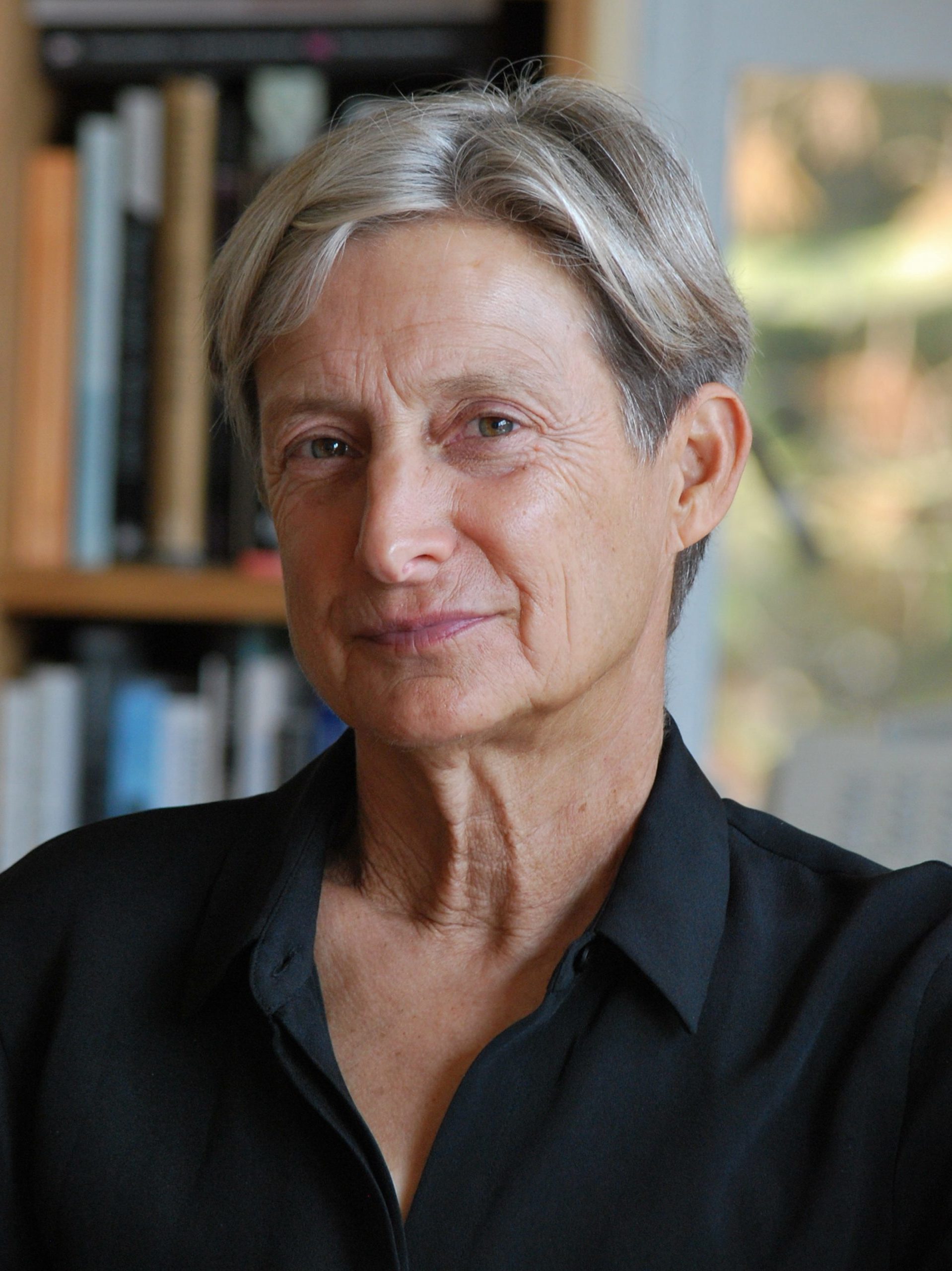

Municipal Bylaws and Anti-Asian Racism: From Past to Present
Date: May 30, 2022
Time: 12:00pm – 1:30pm EDT
Register: https://tinyurl.com/ycdyzaa4
The Town of Newmarket recently implemented a “Personal Wellness Establishments” (PWE) Bylaw that requires workers in alternative massage to obtain accreditation from a Canadian institution. With enforcement, several im/migrant and Asian massage businesses have been ordered to cease all business operations. As a result, im/migrant Asian women face steep financial penalties as well as the loss of needed income and (already limited) employment opportunities.
This bylaw amendment is rooted in a racist, xenophobic, whorephobic, and purported “anti-trafficking” agenda that exposes Asian and im/migrant women to heightened harassment, police interrogation, threat of deportation and the potential loss of legal immigrant status. It is also just one example of the use of municipal licensing and bylaw enforcement to systematic racism and harm low-income, im/migrant Asian people. This panel will examine personal wellness licensing in the context of broader histories of anti-Asian bylaw enforcement in Canada and the US, which can be traced back to the restrictive regulation of Chinese laundries in 1884.
Related information: https://www.butterflysw.org/newmarket-end-racism
Facilitator: Amanda De Lisio, York University
Speakers: Karen Campbell (Canadian Women’s Foundation), Kamala Kempadoo (York University), Elene Lam (McMaster University), Elena Shih (Brown University) and Vincent Wong (Osgoode Hall Law School) in conversation with im/migrant Asian women in alternative massage & Starus Chan (Butterfly), Jessie Tang (CCNCTO), Esther Kao (C2C), Lorraine Chuen (FOCT), and Yves Tong Nguyen (Red Canary Song).
Co-Sponsored by: Butterfly (Asian and Migrant Sex Workers Support Network), Centre for Feminist Research (CFR), Chinese Canadian National Council Toronto Chapter (CCNCTO), Coast to Coast Chinatowns Against Displacement (C2C), Friends of Chinatown Toronto (FOCT), Institute for Feminist Legal Studies (IFLS), Red Canary Song, School of Social Work (McMaster University), and the Transnational Law and Justice Network (TLJN)
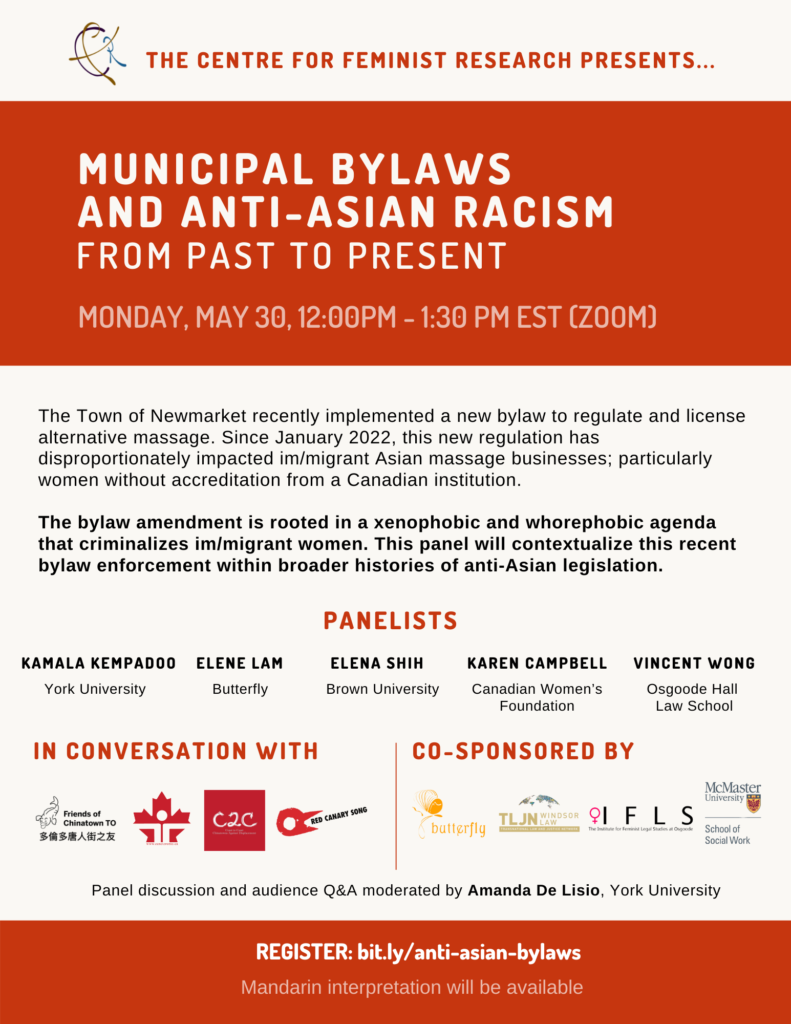
Alt-Congress Events: Interdisciplinary Feminist Sessions
Session 1
Date: May 24, 2022
Time: 1:00pm – 2:30pm EDT
Link: https://yorku.zoom.us/j/98700080996?pwd=MUl4TDY5d05SSEVzUTNGN3JDejMwdz09
Chair: Alana Cattapan, Canada Research Chair, Department of Political Science, University of Waterloo
From Policing to Gratitude: Teaching and Practicing Citation, Sarah Martin
Sarah J. Martin, Department of Political Science, Memorial University, St. John’s NL.
The police model of plagiarism is generally accepted practice in universities. This model relies on statements about theft, and is often accompanied by threats of censure and punishment. A feminist practice of citation can be political (Ahmed), and extend gratitude and recognition (Liboiron). Using experience from the classroom, I will discuss how I have built off Ahmed and Liboiron’s work to reframe citations through assignments that center everyday acts of gratitude and recognition through reflective journals and correspondence with authors.
Coming Back to Care
Hannah McGregor, SFU Publishing, Simon Fraser University
In the university, as in the world, the pandemic has served as a reminder that our institutions will not save us. In response, many of us have been reimagining how we do our work in terms of a feminist ethics of care. But care, as deployed within institutions or by the state, also will not save us. As the many inequities and injustices within the university and beyond are laid bare, care may be leveraged to patch over them and to help institutions maintain their imaginative force in the midst of this crisis. The refusal of care feels necessary, if we want to stop propping up extractive neoliberal systems, and also impossible, if we refuse to abandon others to the violence of those systems. Can we re-envision forms of care that are not economized by the state, the university, or other institutions? How do we demand care while recognizing the harm that has been done in its name?
Feminism is not a joke. But it can be funny.
Sharon Lauricella, Communication and Digital Media Studies, Ontario Tech University
Feminist-lite types argue that sexism is dead (we can make our own drinks and money, tyvm), we can have anything (just lean in!), and we all ought to be mindful that “not all men” are self-centred, rapey freeloaders. Feminism ought to be some serious business. But what if we put in some laughter? Some fun? Does that always dilute the message? This session will outline how feminist humour is alive and kicking, and how fun and play can serve the collective rather than merely pleasing the individual.
Alt-Congress Events: Interdisciplinary Feminist Sessions
Session 1
Date: May 24, 2022
Time: 1:00pm – 2:30pm EDT
Link: https://yorku.zoom.us/j/98700080996?pwd=MUl4TDY5d05SSEVzUTNGN3JDejMwdz09
Chair: Alana Cattapan, Canada Research Chair, Department of Political Science, University of Waterloo
From Policing to Gratitude: Teaching and Practicing Citation, Sarah Martin
Sarah J. Martin, Department of Political Science, Memorial University, St. John’s NL.
The police model of plagiarism is generally accepted practice in universities. This model relies on statements about theft, and is often accompanied by threats of censure and punishment. A feminist practice of citation can be political (Ahmed), and extend gratitude and recognition (Liboiron). Using experience from the classroom, I will discuss how I have built off Ahmed and Liboiron’s work to reframe citations through assignments that center everyday acts of gratitude and recognition through reflective journals and correspondence with authors.
Coming Back to Care
Hannah McGregor, SFU Publishing, Simon Fraser University
In the university, as in the world, the pandemic has served as a reminder that our institutions will not save us. In response, many of us have been reimagining how we do our work in terms of a feminist ethics of care. But care, as deployed within institutions or by the state, also will not save us. As the many inequities and injustices within the university and beyond are laid bare, care may be leveraged to patch over them and to help institutions maintain their imaginative force in the midst of this crisis. The refusal of care feels necessary, if we want to stop propping up extractive neoliberal systems, and also impossible, if we refuse to abandon others to the violence of those systems. Can we re-envision forms of care that are not economized by the state, the university, or other institutions? How do we demand care while recognizing the harm that has been done in its name?
Feminism is not a joke. But it can be funny.
Sharon Lauricella, Communication and Digital Media Studies, Ontario Tech University
Feminist-lite types argue that sexism is dead (we can make our own drinks and money, tyvm), we can have anything (just lean in!), and we all ought to be mindful that “not all men” are self-centred, rapey freeloaders. Feminism ought to be some serious business. But what if we put in some laughter? Some fun? Does that always dilute the message? This session will outline how feminist humour is alive and kicking, and how fun and play can serve the collective rather than merely pleasing the individual.
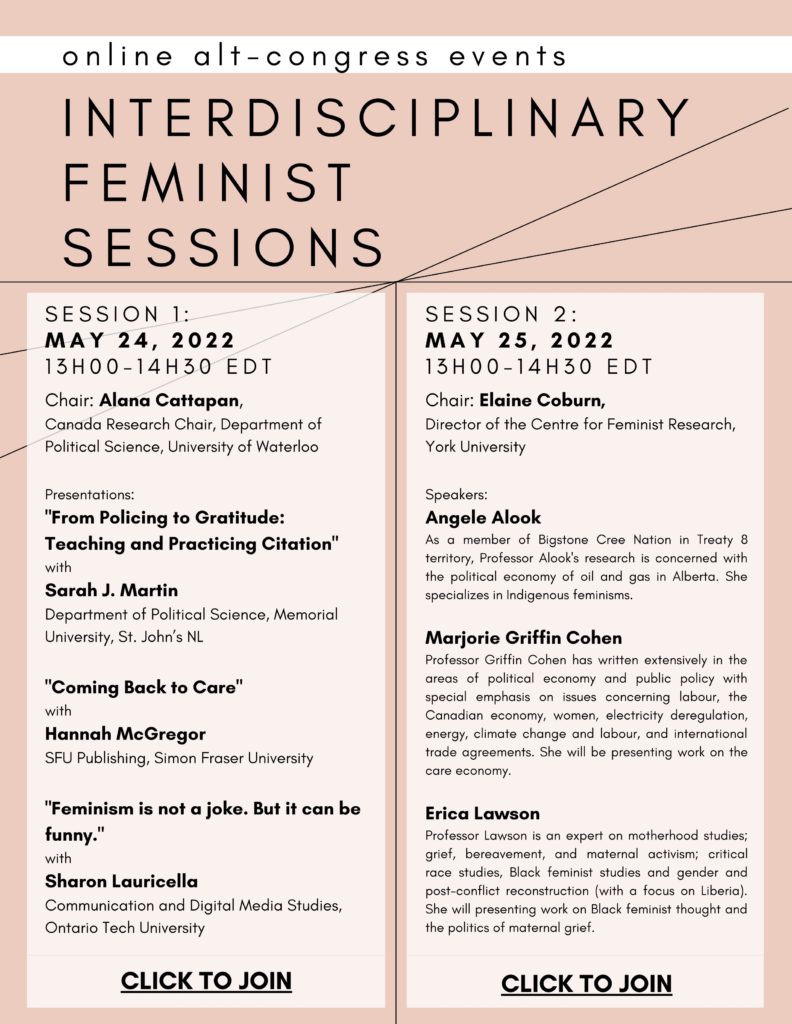
Session 2
Date: May 25, 2022
Time: 1:00pm – 2:30pm EDT
Link: https://yorku.zoom.us/j/95583490290
Chair: Elaine Coburn, Director of the Centre for Feminist Research, York University
Join us for three presentations and then an open discussion with:
Angele Alook, Assistant Professor, Gender, Feminist and Women’s Studies, York University
As a member of Bigstone Cree Nation in Treaty 8 territory, Professor Alook’s research is concerned with the political economy of oil and gas in Alberta. She specializes in Indigenous feminisms,
Marjorie Griffin Cohen, Professor emeritus and economist, Political Science and Women’s Studies, Simon Fraser University.
Professor Griffin Cohen has written extensively in the areas of political economy and public policy with special emphasis on issues concerning, labour, the Canadian economy, women, electricity deregulation, energy, climate change and labour, and international trade agreements. She will be presenting work on the care economy.
Erica Lawson, Associate Professor,Gender, Sexuality, and Women’s Studies, Western University
Professor Lawson is an expert on motherhood studies; grief, bereavement, and maternal activism; critical race studies, Black feminist studies andgender and post-conflict reconstruction (with a focus on Liberia). She will presenting work on Black feminist thought and the politics of maternal grief.
Solidarity and Liberation Beyond Borders: Palestine
Date: May 18, 2022
Time: 7:00pm EDT
Register: https://yorku.zoom.us/webinar/register/WN_dd5kjpyyRAyqGb9mL-q36g
Join York University’s Centre for Feminist Research for this important roundtable at the meetings of Congress. A panel of activists and academics concerning Canada’s complicity in global imperialism and genocide in Palestine. Coinciding closely with the 74th anniversary of the Nakba – understood by Palestinian’s as the catastrophe – the panel will address the Israeli state’s colonial apartheid regime. Significantly, panelists will be asked to comment on the role and responsibility of the Canadian state in international human rights struggles. Speakers will include Palestinians at home and in exile and Jewish solidarity activists, discussing how the Palestinian struggle has become a lightning rod for both global oppression and global solidarity. We will explore the important struggles for freedom taking place in Palestine, as well as how activists and academics here in Toronto are supporting those struggles. This event is co-sponsored by Independent Jewish Voices-Toronto, Independent Jewish Voices-York, Palestinian Solidarity Collective, Palestinian Youth Movement, and Showing Up for Racial Justice.
Panelists:
Sheryl Nestel, IJV Toronto
Alejandro I. Paz, Jewish Faculty Network
Sarah Abu-Sharrar, Palestinian activist and artist
and a representative from the Palestinian Youth Movement
Moderated by Anna Lippman
Information Session: Introducing the Critical Femininities Research Cluster
Date: May 4, 2022
Time: 1:00pm – 2:00pm EDT
Register: https://yorku.zoom.us/meeting/register/tJwtdOyhrTkoH9ybe3vSke8EqdoknHM_nzYH C
You will receive a link to join the meeting after registering.
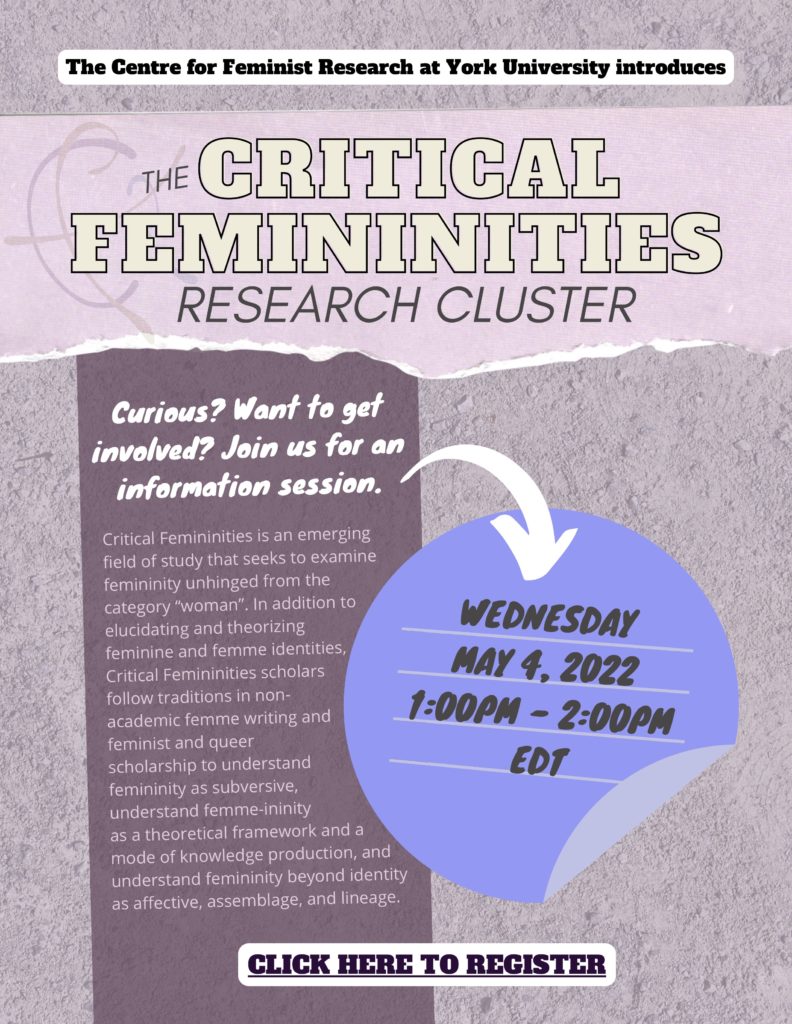
Join us to find out more about the new Critical Femininities Research Cluster at the Centre for Feminist Research. Learn about the Critical Femininities research activities taking place at the CFR and how you can get involved whether you are a faculty member, graduate student, or community member.
Series: Sexuality and Nationalism in South Asia
Co-sponsored with York Centre for Asian Research
Schedule:
Date: March 11, 2022
Time: 10:00am to 11:00am EST
Speakers:
“Homopopulism” with Niharika Banerjea
Ambedkar University Delhi
“Homonationalism and Homocapitalism” with Rahul Rao
SOAS University of London
Register: https://yorku.zoom.us/webinar/register/WN_HplQ-TQ_TmuEsmhhevN6Tg
Date: April 15, 2022
Time: 1:30pm to 2:30pm EST
Speakers:
Naveen Minai, University of Toronto
Nayma Qayum, Manhattanville College
Date: April 18, 2022
Time: 10:30am to 11:30am EST
Speakers:
Adnan Hossain, Utrecht University
Themal Ellawala, University of Illinois, Chicago
Date: April 22, 2022
Time: 1:00pm to 2:30pm EST
Speakers:
Vaibhav Saria, Simon Fraser University
Aniruddha Dutta, University of Iowa
Gowri Vijayakumar, Brandeis University
Writing for Broader Publics III: Abstracts, Pitches, and “Knowledge Mobilization” for Grad Students
Date: April 12, 2022
Time: 1:30pm – 3:00pm EDT
Register: https://yorku.zoom.us/meeting/register/tJMsceyhqD8jHtbTfssw-quhkNkA1SzipUIg
You will receive a link to join the meeting after registering.
Join us for the third event in our 2022 Knowledge Mobilization series. In this panel, speakers will demystify “knowledge mobilization,” provide concrete examples of translating academic ideas into popular forms like podcasts, zines, ‘think pieces,’ and personal essays, and hold a Q&A. This event is geared toward graduate students but is open to all. Read more about our speakers below.
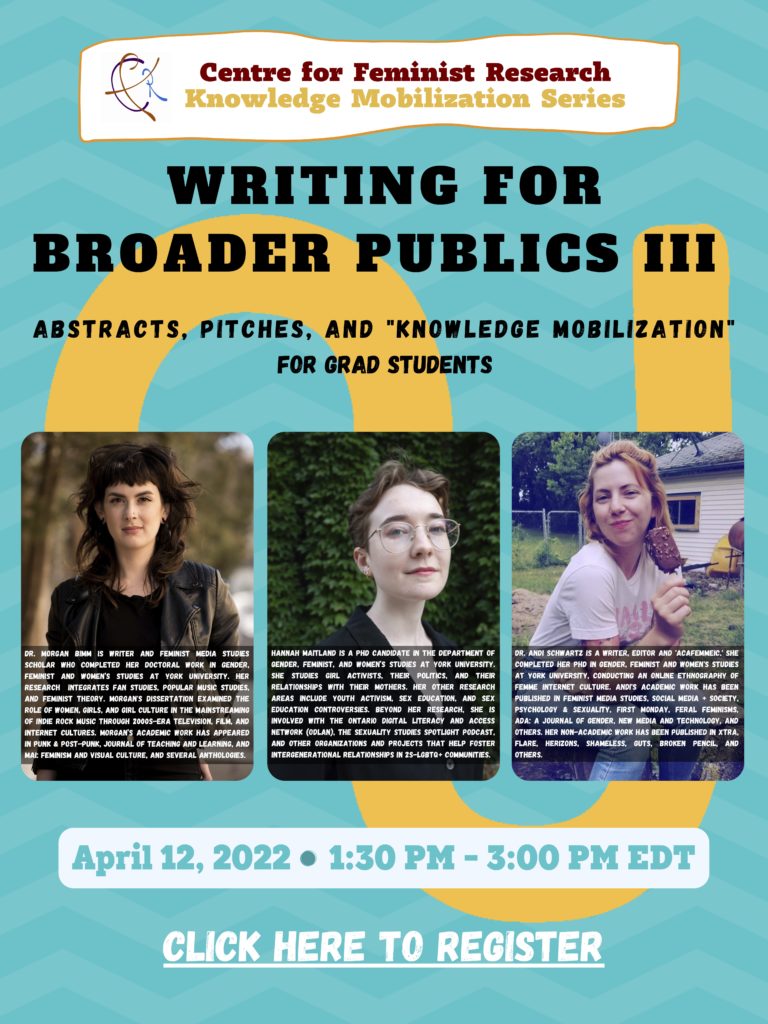
Dr. Morgan Bimm is writer and feminist media studies scholar who recently completed her doctoral work in Gender, Feminist and Women’s Studies at York University. Her research interests include integrating fan studies, popular music studies, and feminist theory, particularly as they relate to how certain cultural archives are (mis)remembered. Her dissertation examined the role of women, girls, and girl culture in the mainstreaming of indie rock music through 2000s-era television, film, and internet cultures. Morgan’s academic work has appeared in Punk & Post-Punk, Journal of Teaching and Learning, and MAI: Feminism and Visual Culture, as well as several anthologies.
Hannah Maitland is a PhD candidate in the department of Gender, Feminist, and Women’s Studies at York University. She studies girl activists, their politics, and their relationships with their mothers. Her other research areas include youth activism, sex education, and sex education controversies. Beyond her research, she is involved with the Ontario Digital Literacy and Access Network (ODLAN), the Sexuality Studies Spotlight podcast, and other organizations and projects that help foster intergenerational relationships in 2S-LGBTQ+ communities.
Dr. Andi Schwartz is a writer, editor and ‘acafemmeic.’ She completed her PhD in Gender, Feminist and Women’s Studies at York University, conducting an online ethnography of femme internet culture. Andi’s academic work has been published in Feminist Media Studies, Social Media + Society, Psychology & Sexuality, First Monday, Feral Feminisms, Ada: A Journal of Gender, New Media and Technology, and others. Her non-academic work has been published in Xtra, Flare, Herizons, Shameless, Guts, Broken Pencil, and others. She is also the creator of the popular Soft Femme zine series and a blog editor for Shameless Magazine.
Virtual Exhibit: Gender and Peace: Resistance and Cultural Preservation Through Art
Co-organized by Kabul Arts Kafe and the Art of Freedom Project
Date: March 18, 2022
Time: 12:00pm – 1:00pm
Register: https://yorku.zoom.us/meeting/register/tJUrc–rqDgiH9M-YEXifhvmUzZjWBWr9w3A
Kabul Arts Kafe believes in supporting the global network of contemporary arts and artists from Afghanistan by promoting the works of contemporary Afghan artists and connecting them to available opportunities in terms of scholarship, exhibitions, and grants.
This event will feature artists:
Hayede Jamshidi
Lida Afghan
Begum Dawlatyan
Malala Mehraban
Mursal Roshna
Wahida Jabarzai
Husna Musleh
Zolai Sultan
and a discussion moderated by Shataakshi Verma
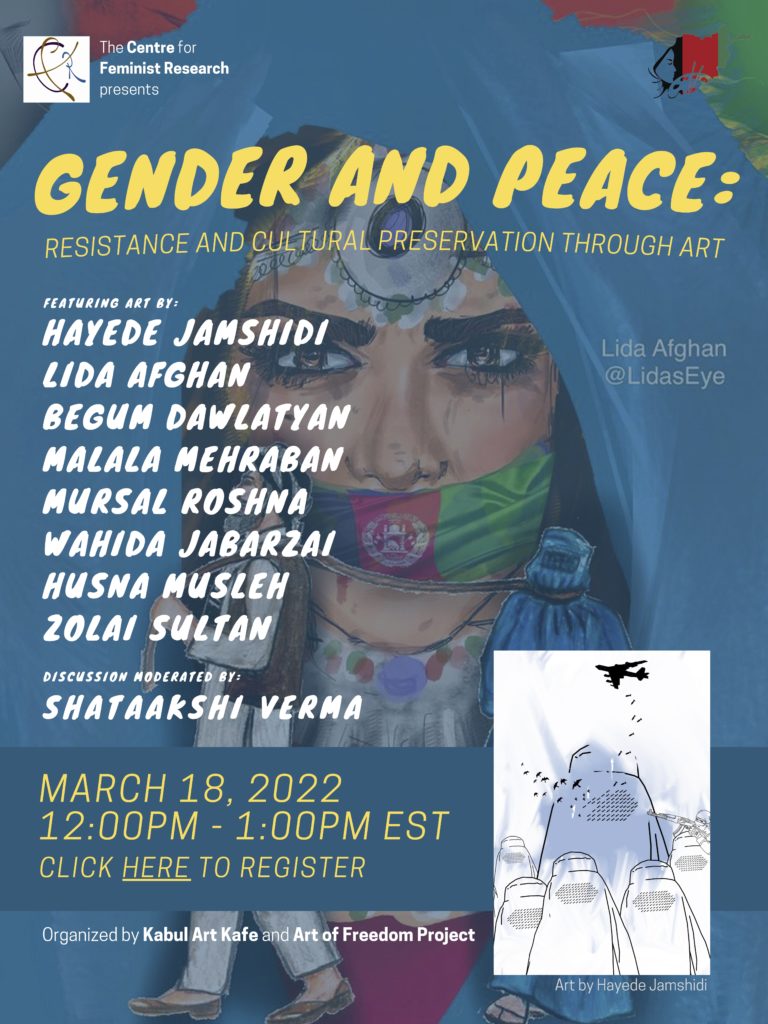
Postdoctoral Scholar Talk: “‘wathinta abafazi, wathinta imbokodo’: Echos of Women’s Resistance in Africa” with Ruth Murambadoro
Date: March 16, 2022
Time: 11:30am – 1:00pm EST
Registration: https://yorku.zoom.us/webinar/register/WN_J9i3FnNKQxmrp6R-es7Z_Q
Postdoctoral Fellow Dr. Ruth Murambadoro is one of the inaugural recipients of the Provost’s Postdoctoral Fellowships for Black and Indigenous Scholars. Dr. Ruth Murambadoro is an African scholar with research interest in women, transitional justice, gender justice, peacebuilding and politics of the Global South. Her work focuses on understanding the intersecting realities that inform human interactions and the role of African value systems in re-centering and redressing encounters that damage the essence of humanity. She has conducted ethnographic field research in Zimbabwe, South Africa, Mozambique and Ghana, where she explored African mechanisms of resolving conflicts and their efficacy in meeting the justice needs of communities living on the margins. As a postdoctoral fellow at the Centre for Feminist Research she is leading the project, ‘Gender justice and narratives of violence by women in post-colonial Zimbabwe,’ which involves working with women’s social movements in Zimbabwe and the diaspora to produce new insights on how networks of women provide avenues for healing, justice and peace, outside the auspices of the state. Ruth has growing interest in curating women’s stories and amplifying African voices in peace education and scholarship.
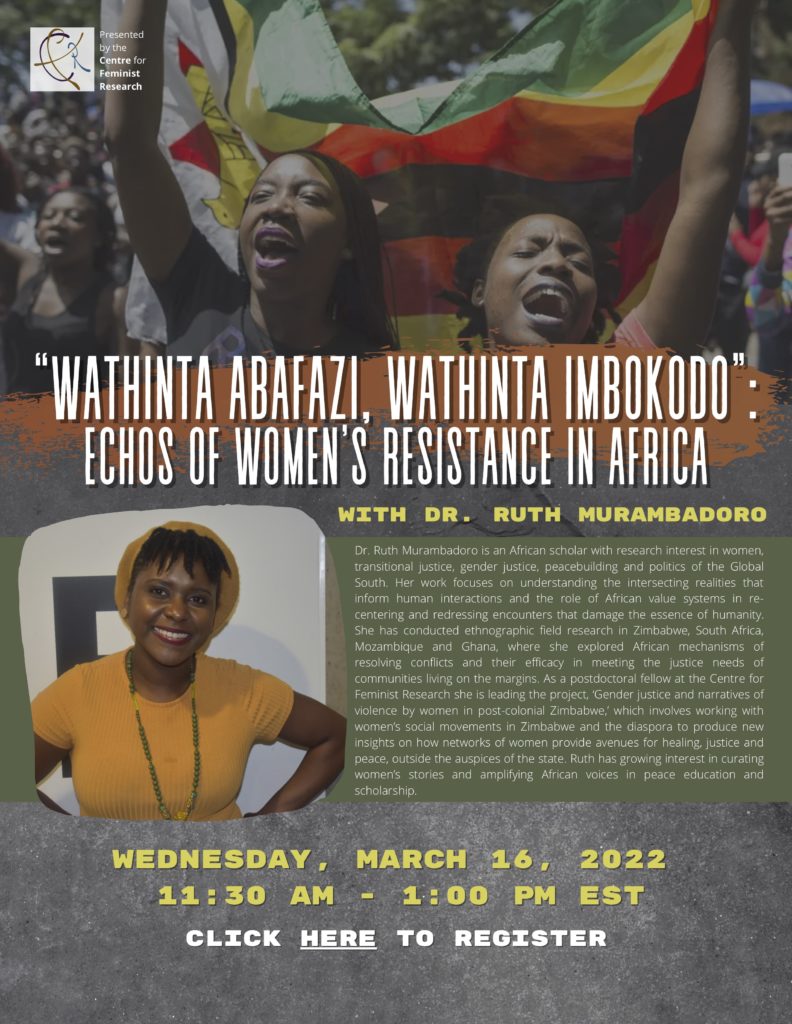
GFWS Annual Lecture: “Indigenous Feminism, Indigenous Resistance, Canadian Oppression: What Canada Doesn’t Tell You” with Joyce Green
Co-Sponsored with the Gender, Feminist, and Women’s Studies Program
Date: March 10, 2022
Time: 2:30pm – 4:00pm EST
Register: https://yorku.zoom.us/webinar/register/WN_hbUWxHpcQKK1KtXBAtFvHw
GFWS and the CFR present the GFWS Annual Lecture with Dr. Joyce Green. Joyce Green is a citizen of the Ktunaxa Nation, and Professor Emerita in the Department of Politics and International Studies at the University of Regina. Her research interests have focused on issues of Indigenous women’s rights and liberation, decolonization in Canada, and democracy and citizenship in Canada. She has been preoccupied with the project of Indigenizing the university and with reconciliation problematics. Her published work has dealt with Indigenous-state relations; Indigenous feminism; citizenship, identity, and racism in Canada’s political culture; Indigenous human rights, and reconciliation in the settler state context in Canada. More recently she has turned to research relating to Ktunaxa Nation matters, including its contemporary constitution, and its cultural and political problematics since colonization. She is the editor of Making Space for Indigenous Feminism (Fernwood Publishing and Zed Books, 2007; 2nd. ed 2017) and of Indivisible: Indigenous Human Rights (Fernwood Publishing 2014). Dr. Green is English, Ktunaxa, and Cree-Scottish Metis, and her family’s experiences have provoked much of her scholarly and political work. She currently lives in ʔa·kiskaqⱡi?it, in ʔamak̓is Ktunaxa (Cranbrook, B.C., in Ktunaxa territory).
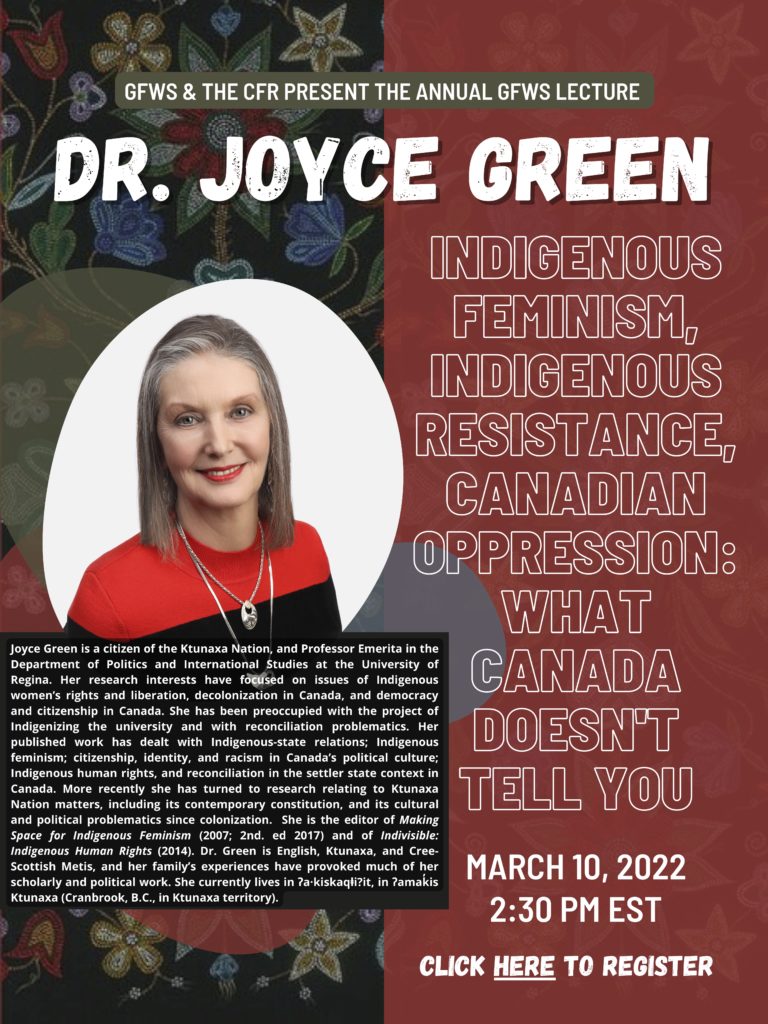
Writing for Broader Publics II: Panel Discussion and Q&A with Melora Koepke, Adam Leith Gollner, and Robbie Dillon
Date: March 9, 2022
Time: 11:30am – 1:00pm EST
Register: https://yorku.zoom.us/webinar/register/WN_lKqsbT8vTO23v-XxHq-onw
Part of the CFR’s Knowledge Mobilization series. Join us to hear from our speakers:
Melora Koepke is a widely published nonfiction writer/journalist, and Ph.D. candidate working between Vancouver, Montreal, and Paris. Her work has been published in National Geographic, The Walrus, and the Globe and Mail, and has been broadcast on the CBC and at the NFB. She was a Contributing Editor, film critic and reporter at Hour Magazine from 2000-2011. She has received a number of professional and scholarly awards, including a medal in social journalism at the National Magazine Awards. She holds an M.A. in Media Studies from Concordia University, and a B.A. in Communications (Film Production) and English Literature from Concordia University.
Adam Leith Gollner is the author of two books of narrative nonfiction: The Fruit Hunters and The Book of Immortality, both published by Scribner in the US and Doubleday Canada. His writing is in The Paris Review, Vanity Fair, Smithsonian, The New York Times, and The New Yorker. He teaches creative nonfiction at Scuola Holden in Turin, Italy.
Robbie Dillon was the Senior Founding Editor of Vice Magazine. He has written for a number of publications, including The Walrus, Saturday Night, and High Times. He hates bios.
“Gender Equality in Low-Carbon Economies: Continuities, Contradictions, Disruptions” with Bipasha Baruah
Part of York University’s Climate Change Research Month
Date: March 3, 2022
Time: 12:00pm – 1:30pm EST
Register: https://yorku.zoom.us/webinar/register/WN_q_iPALqXTK2Y3-6XS8egxw
Concerns about environmental sustainability and fossil-fuel insecurity have motivated countries around the world to transition to clean energy supplies derived from renewables such as solar, hydro, bioenergy, geothermal and wind. Since producing and distributing renewables is more labor-intensive than producing and distributing fossil fuels, this shift is creating new employment opportunities and addressing energy poverty in remote or under-served communities. Although there is tremendous potential to create employment in renewable and clean energy almost everywhere in the world, there is growing concern that women, who are already underrepresented in the sector, will become even more marginalized if gender equity policies and programs are not proactively planned and implemented. This presentation identifies opportunities and constraints for women’s employment in renewable and clean energy in industrialized, emerging and developing economies, and makes recommendations for optimizing their participation.
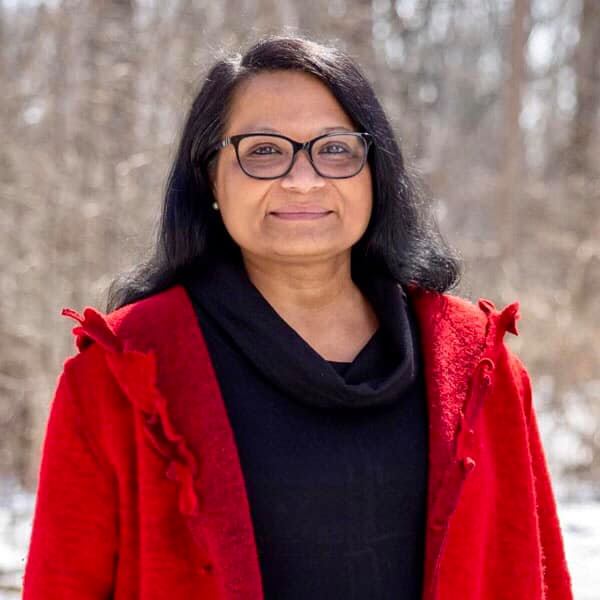
Bipasha Baruah is Professor and Canada Research Chair in Global Women’s Issues at Western University’s Department of Gender, Sexuality and Women’s Studies. Her current research aims to understand how to ensure that a global low-carbon economy will be more gender-equitable and socially just than its fossil-fuel-based predecessor. Author of a book and more than 100 peer-reviewed articles, book chapters, and other works, Dr Baruah serves frequently as an expert reviewer and advisor to Canadian and intergovernmental environmental protection and international development organizations. The Royal Society of Canada named her to The College of New Scholars, Artists, and Scientists in 2015.
Visiting Scholar in Sexuality Studies Talk: “Beyond the Paradox of Rights: Notes on ‘Khwajasara Becoming’ in Pakistan” with Dr. Salman Hussain
Co-presented with Sexuality Studies
Date: February 17, 2022
Time: 4:30pm – 6:00pm EST
Registration: https://yorku.zoom.us/webinar/register/WN_RkHeJUJmQwmGeRN22gcrMA
Dr. Salman Hussain is the 2021-2022 Visiting Scholar in Sexuality Studies and a Banting Postdoctoral Fellow in the Department of Social Anthropology at York University. Dr. Hussain is a Cultural Anthropologist with research interests in Human Rights and Social Movements, Gender and Sexuality Studies, Postcolonial Theory, Political Violence and Terror, and Law and Decolonization. Dr. Hussain has held research and teaching fellowships at The Gradauate Center, CUNY, Max Planck Institute for Social Anthropology, and University of Massachusetts, Amherst.
In his postdoctoral project, he studies new forms of queer activism at the intersection of liberal legality and sexual biopolitics in Pakistan. He examines how activism for demanding gender rights and contesting inequality and marginalization revolves around the evidentary politics of the body by traditional communities of khwajasaras. Hussain’s project is a part of his long-term research and activist commitment with the khwajasara communities and follows their engagement with third gender laws in the country.
His research has appeared in Political and Legal Anthropology Review, Postcolonial Studies, Identities: Global Studies in Culture and Power, and Anthropologica.
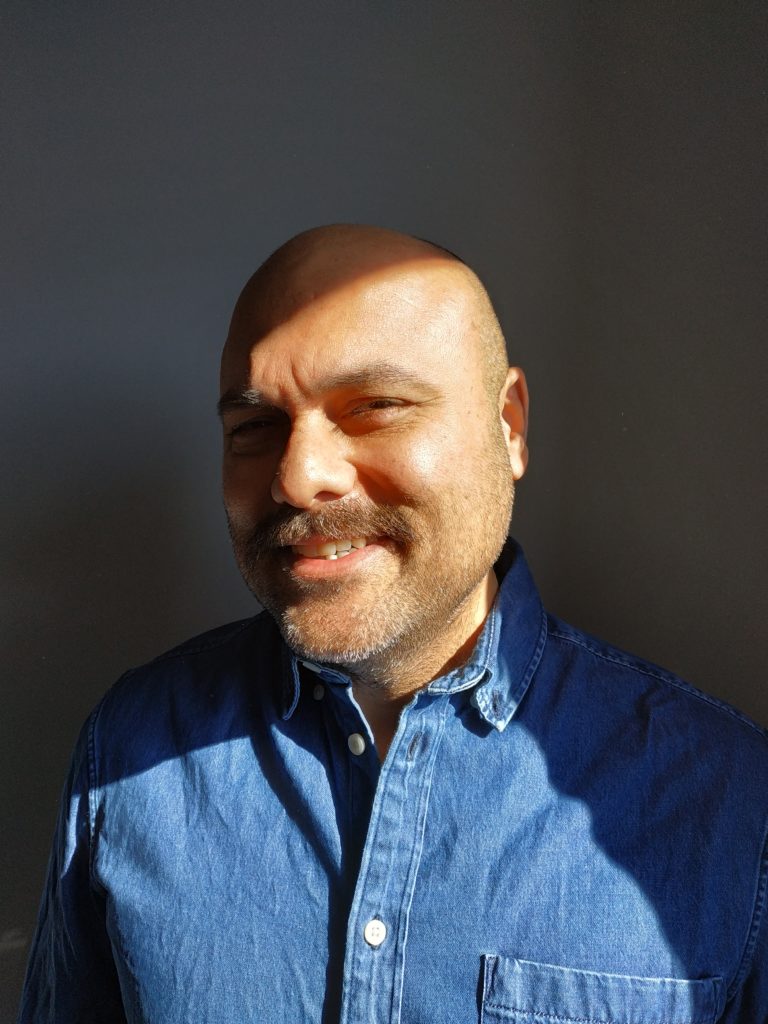
Women in Leadership
Co-Sponsored with GSPIA
Date: February 15, 2022
Time: 5:30pm to 7:00pm EST
Registration: Coming soon!
with speakers:
Paulette Senior, CEO and President, Canadian Women’s Foundation
Dr. Kristin Blakely, Senior Fellow GSPIA
Christine Boyle, Vancouver City Councillor
Dr. Dawn Lavell-Harvard, Director First Peoples House of Learning, Trent University and past President of the Ontario Native Women’s Association
The event will be moderated by Dr. Minelle Mahtani, UBC Professor and past Senior Advisor to the Provost on Racialized Faculty, UBC
Book Launch: Appealing Because He Is Appalling: Black Masculinities, Colonialism, and Erotic Racism, Edited by Tamari Kitossa
Co-presented by the Harriet Tubman Institute for Research on Africa and its Diasporas and the Centre for Feminist Research
Date: February 8, 2022
Time: 5:00pm – 6:30pm EST
Registration: https://yorku.zoom.us/meeting/register/tJMud–hqDoqHdUSu8DBeFq-k2BLOyg79lKO
This collection, published by the University of Alberta Press, invites us to think about how African-descended men are seen as both appealing and appalling, and exposed to eroticized hatred and violence and how some resist, accommodate, and capitalize on their eroticization.
Join speakers:
with
Tamari Kitossa, Editor
Panellists:
Kemar McIntosh
Dennis Howard
Ryan Burke
and
Elaine Coburn, Moderator
CFR-Nexus-Robarts Connects: Demystifying Academic Milestones II
Date: February 4, 2022
Time: 11:00am EST
Registration: https://yorku.zoom.us/webinar/register/WN_VFv1xeEQSt6i4pYua7UfSg
Understanding the Peer-Review Process and Pitching a Dissertation as a Book
with speakers:
Elaine Coburn, York University
Fazeela Jiwa, Fernwood Publishing
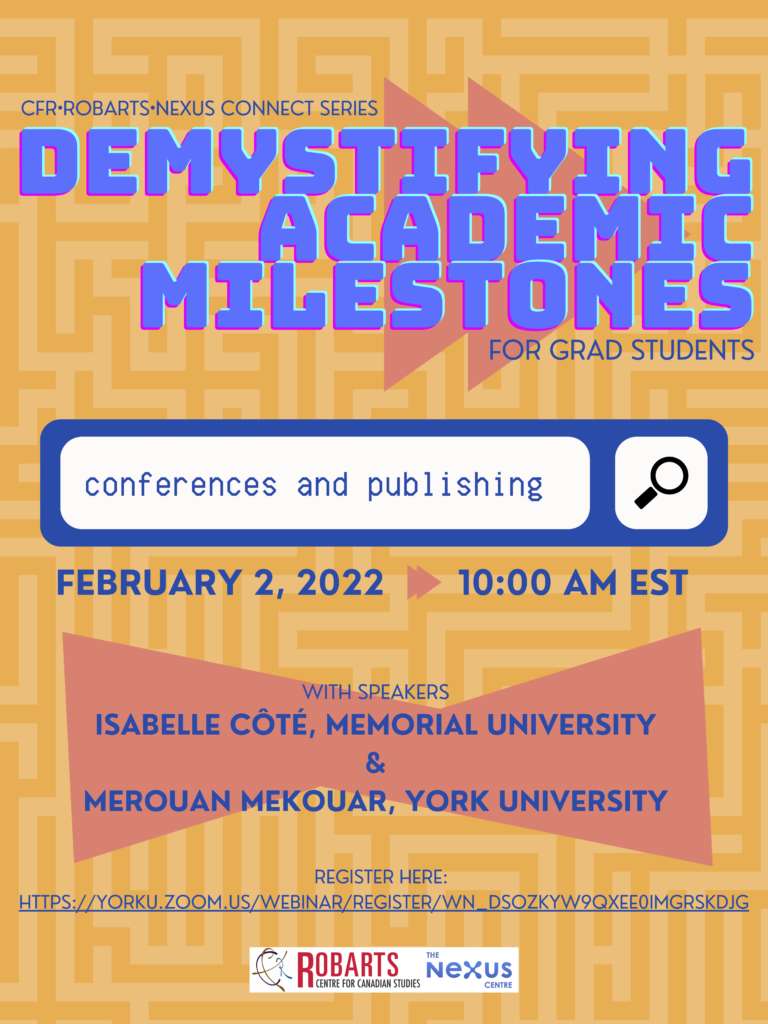
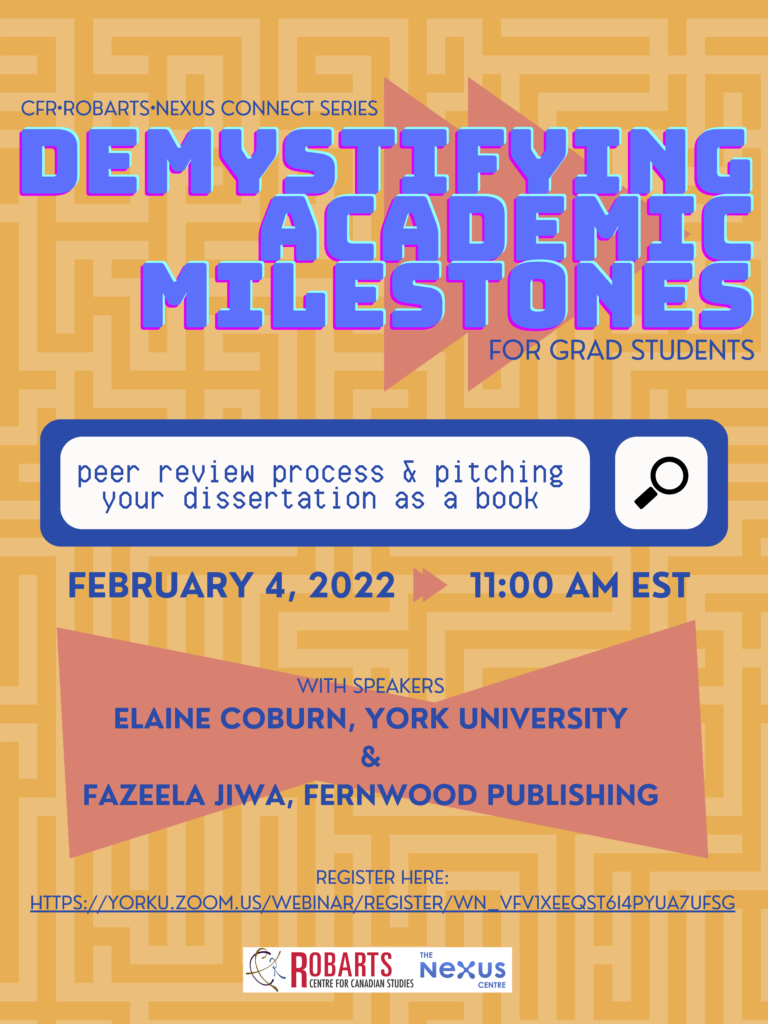
CFR-Nexus-Robarts Connects: Demystifying Academic Milestones I
Date: February 2, 2022
Time: 10:00 am EST
Register: https://yorku.zoom.us/webinar/register/WN_dSOZKYW9QxeE0iMGrSKDjg
Situating conferences and publishing in one’s grad studies with speakers:
Isabelle Côté, Memorial University
Merouan Mekouar, York University
Q&A: Writing for broader publics with the editor of the Literary Review of Canada, Kyle Wyatt
Date: January 25, 2022
Time: 3:00pm – 4:30pm EST
Registration: https://yorku.zoom.us/webinar/register/WN_S7I3wDB4QiCCo-jv5KIqsA
Kyle Wyatt is the editor-in-chief of the Literary Review of Canada and a senior resident at Massey College. He holds a PhD from the University of Toronto, where he won the A.S.P. Woodhouse Prize for Best Doctoral Thesis in the Department of English.
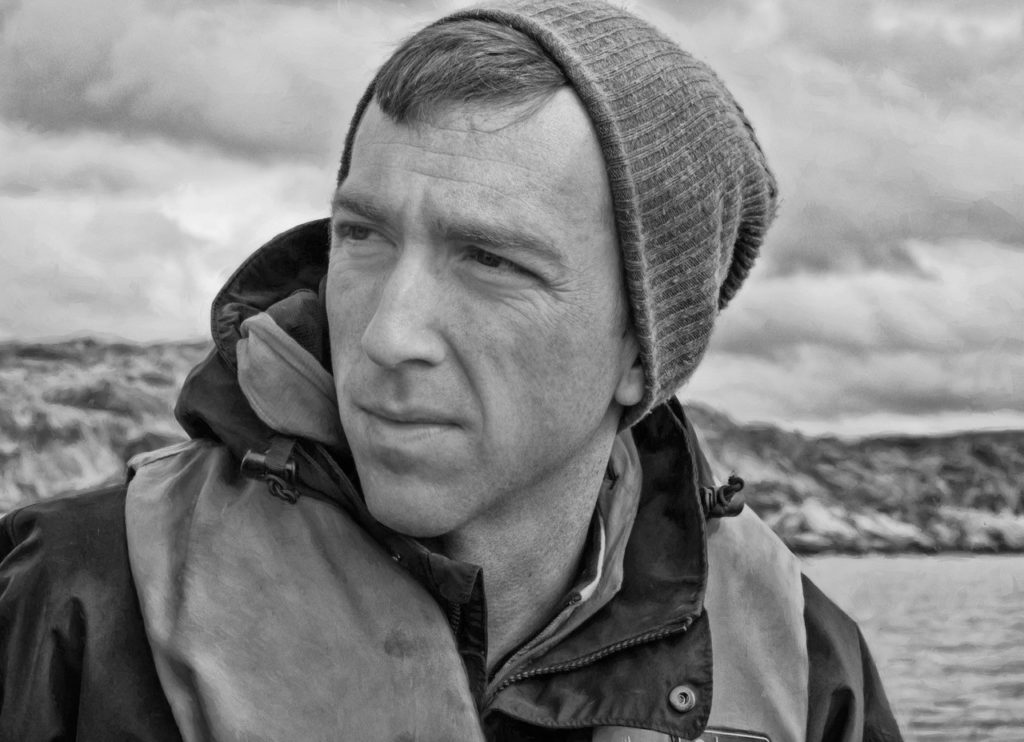
CFR Meet and Greet 2022
Date: January 19, 2022
Time: 3:30pm – 5:00pm EST
Register: https://yorku.zoom.us/meeting/register/tJIlcOysqDIuHdyNNXc0UMziTysaSMq0hR-8
You will receive a link to join the meeting after registering.
This virtual meet and greet is open to all associates and potential associates of the CFR. Join us to find out more about what we do and how we can support you, and to share your work and ideas and hear from other CFR associates about their research.

Book Launch: Demanding Equality: One Hundred Years of Feminism in Canada by Joan Sangster
Date: November 18, 2021, Virtual event
Time: 3:00pm – 4:30pm EST
Register:https://yorku.zoom.us/webinar/register/WN_DzKOdd4ATtWkJ9Y2Kgz2Xw
“For one hundred years women fashioned different dreams of social transformation in their search for equality, autonomy, and dignity; yet what is Canadian feminism?
Demanding Equality offers illustrations of feminist thought and organizing from mid-nineteenth-century, Enlightenment-inspired writing to the multi-issue movement of the 1980s. Broadening our definition of feminism – and recognizing that its political, cultural, and social dimensions are entangled – Joan Sangster explores the different pathways pursued to gain equality. She challenges the popular “wave” theory, concluding that feminist activism was continuous, despite changing significantly across decades.
Demanding Equality presents a picture of a heterogeneous movement characterized by both alliances and fierce internal debates. This comprehensive rear-view look at feminism in all its political guises encourages a wider public conversation about what Canadian feminism has been, is, and should be.”
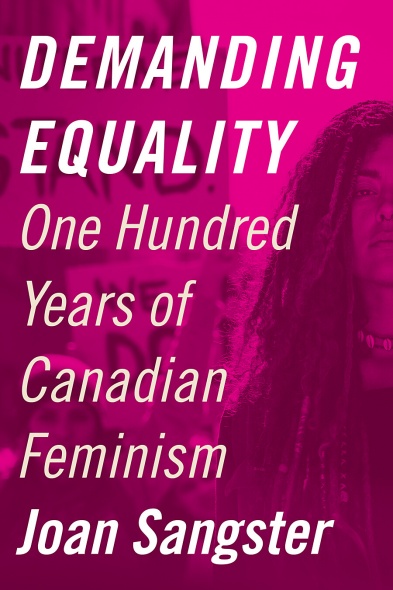
Roundtable: “Empowering Solidarities: Sharing Women’s Experiences from War Zones and Beyond”
Date: November 15, 2021, Virtual event
Time: 11:00am – 2:00pm EST
Register:https://yorku.zoom.us/webinar/register/WN_none4R7iT_SSFQJs77p0Yg
Join CFR Visiting Scholars Dr. Zahra Hojati & Dr. Fazileh Dadvar-Khani as they host a roundtable discussion of women’s experiences in war zones, from Afghanistan, Iraq, Syria, Bosnia, Somalia, and Iran.
Speakers:
Alina Haidary has a Master degree in immigration settlement study at Ryerson university who she also was the recipient of Merit fellowship. Alina was the recipient of many awards, included Afhgan Professionals of Ontario in 2017,& Zonta International, in Netherlands in 2015 as a Recipient of the Excellence in Advocacy Award, just a few of name. Alina has over 10 years of working experience for immigrant and refugee settlements with many organizations. She has also the knowledge and experience in negotiation, development, and management and she is also an integration officer at Immigration, Refugees and Citizenship of Canada (IRCC) with various settlement service providers in Toronto.
Asma Faizi has a Juris Doctor degree from the University of Toronto. She is currently General Counsel at a not-for-profit organization that represents hundreds of thousands of Canadian and foreign writers, visual artists and publishers, and their works. Asma became a Board member with the Afghan Women’s Organization in 1998 and has been the President and Chair of the Board of Directors since 2008. For over twenty years, domestically and internationally, she has been advocating on issues related to the plight of Afghan women, challenges faced by newcomers to Canada and on human rights issues for refugees worldwide.
Adela Jusic holds a MA in Democracy and Human Rights in Southeast Europe. She is an artist who presented her work in more than 100 international exhibitions and is an award winner of the Henkel Young Artist Price Central Eastern Europe in 2011 as a few of name. She is a co-founder and worked on cultural projects at the Association for Culture and Art Crvena from 2010-2019, and is one of the 2 creators of the Online archive of the Anti-fascist struggle of women of Bosnia and Herzegovina and Yugoslavia.
Narges Abyar has a Master degree in Persian literature; she started writing books in 1997. Up to the present, she has written more than thirty story and fiction books for children, young adults and adults. She was selected as an Oscar Academy member in 2020. She has written and directed five drama films. Her recent film is called, Pinto. She had also made several short and feature-length documentaries since 2005. Her first experience was a fiction film called “The Kind Dead-End”. She pursued her directing career further with seven features and documentaries and four cinema films.
Khanim Raheem Latif is the founder and the director of Asuda Organization (2001 – 2018), an independent NGO for combating violence against women based in Sulaimaniyah with offices in Erbil, Duhok. After one year, she founded the Asuda’s Women Shelter, which was the first women’s protection shelter in Iraq. Despite the religious, cultural, social, and political constraints and the absence of a law about women’s shelters and women’s rights violations in Iraq, Ms. Lateef was able to stand for survivors of Gender –based Violence to protect and support women in Iraq.
Khawlah Mousa M. Ali Al-Khazraji has worked as Chairwomen of Women Empowerment Committee in Mayoralty of Baghdad from 2012-2015. She attended many activities and training courses outside and inside Iraq related to human rights, women’s rights, gender equality, strategic planning, time management, human development, public relations and human resources. She also has worked as a director of foreign affairs, translator and editor, relation with the media committee, and as chairwomen of women empowerment committee with Mayoralty of Baghdad and other organizations.
Fatina Ahmad Jameel has attended many certificate programs and received appreciation for her work and efforts for gender equality, women empowerment, development programs, civil society engagement and human rights from national and international organizations. She also has attended provincial reconstruction programs and projects with the Baghdad provincial council. She conducted advocacy programs for both women and youth, mainly violence against women and youth development projects in Baghdad.
Istar Ahmad holds BA in Social Work and Master in international Relations with specific focus on peace and development. Istar is a researcher, advocate and Social Development Specialist with a commitment and passion to advancing gender equality, education, and empowerment for social transformation at all levels. As a former UN staff, volunteer and social policy activist, Istar played critical role in advocating Education as a vehicle for sustainable development at all levels. Istar works with Humanitarian HR as Gender & Policy Advisor for the Horn of Africa Program.
Mania Elendari has a bachelor’s degree in media from the University of Damascus. Mania is the founder and director of the Sabbara organization in Syria. She has work experience with community organizations to support newcomers, their settlement needs, provide information and workshops for them. She also worked as a journalist and researcher with the Syrian magazines. In her work she helped refugees’ women and children in conflict areas and has an effective role to advocate their right of education.
Mayson Al-Misri has a BA in media from Damascus University . She has the experience of training children in war zone, as well as being a journalist for diverse media from 2009-2018. She providedthe agencies with news reports, news coverage and television reports.
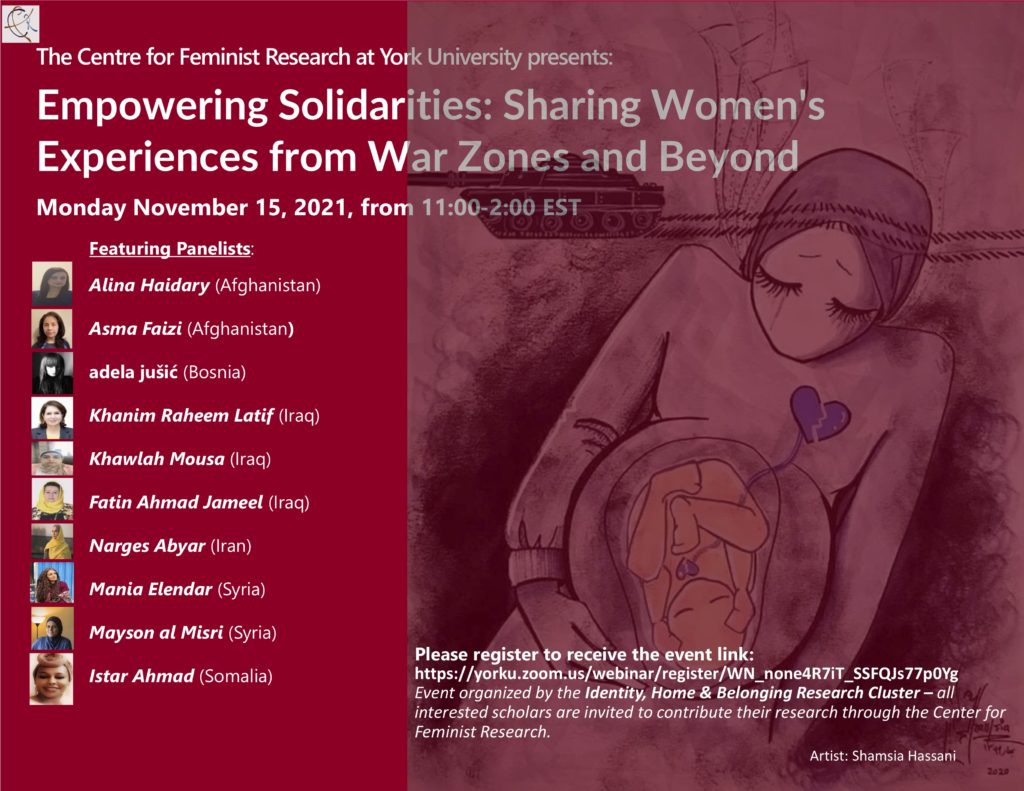
Femme Scholars Series: Rust Belt Femme Book Talk with Dr. Raechel Anne Jolie
Co-Sponsored by the Gender, Feminist, and Women’s Studies Graduate Program, the Culture and Communication Studies Graduate Program, and the Sexuality Studies Program
Date: Wednesday, November 10, 2021, Virtual event
Time: 11:30am – 1:00pm EST
Register by November 9: https://yorku.zoom.us/meeting/register/tJIld-ysqD8vG9OkS55pHBUyDzdjtg38IL7M
The Femme Scholars Series enters its second year with a book talk by Dr. Raechel Anne Jolie.
Raechel Anne Jolie (she/they) is a writer and educator based in Cleveland, Ohio. She holds a PhD in Critical Media Studies, with a minor in Feminist & Critical Sexuality Studies from the University of Minnestoa. Her writing has appeared in The Baffler, Bitch, Teen Vogue, In These Times, among other publications. Jolie is also the editor and co-creator of The Prison Arcana tarot zine, made in collaboration with incarcerated artists. Rust Belt Femme is their first memoir and received recognition in NPR’s Favorite Books of 2020, was a finalist in the Heartland Bookseller’s Award, and was the winner of the Independent Publisher Book Award in LGBTQ Nonfiction.

Indigenous Women’s Speakers Series: “Mapping Urban Communities of Care in Cartographic Art Practices” with Dr. Mishuana Goeman (Virtual Event)
Co-Sponsored by the Faculty of Health
Date: October 27, 2021
Time: 3:00pm – 4:30pm EDT
Registration: https://yorku.zoom.us/webinar/register/WN_cONSyrOGT-aCnvdM5ajk7A
Recently Indigenous artist have used cartographic tools in an artistic way to reinvision the colonial landscape, to speak to and against the mass development of Native land, uproot white supremacist architecture and create awareness of original peoples ongoing caretaking in the cityscape. Creating Indigenous Visibility in Urban Spaces is a necessary remapping of the city. Making visible Indigenous landscapes unsettle a visual settler terrain that structures ongoing dispossession. These powerful mappings are key as faceless mass development of tribal lands continue to threaten the ecologies and landscapes of Indigenous homelands, indeed all our homelands. Indians are the beautiful “graffiti,” in the words of Leeanne Betasamosake Simpson, denying settler permanence. Our art, bodies and actions are embodied sovereignty on the settler landscapes meant to erase and eradicate Indigenous forms of relationality. Artistic renditions of the relationship between the human, more-than-human, and landscapes are affective in nature and thus deep in mapping larger communities of care. We will explore the recent artistic maps of Cara Romero’s collaborative Tongva Land project, River Garza’s commissioned work for UCLA, and Mercedes Dorame’s installation at the Fowler’s The Map and the Territory alongside more traditional maps that depict the urban development of Los Angeles.
Book Launch: Frontiers of Feminism: Movements and Influences in Québec and Italy, 1960-80, by Dr. Jacinthe Michaud
Co-Sponsored by the Robarts Centre for Canadian Studies
Date: October 26, 2021
Time: 4:00pm – 5:30 pm EDT
RSVP: www.tinyurl.com/FrontiersOfFeminism
From the mid-1960s to the mid-80s, feminist activism in North America and Europe reached its peak, animated by a disparate array of issues and ideas. Frontiers of Feminism compares Québécois and Italian feminisms, revealing both the synergy between feminism and the left and the influence of American and French women’s movements on those in Québec and Italy.
This astute study combines feminist materialism and social movement theories to explore the principal ideological concerns of Québécois and Italian feminists, including Marxism, nationalism, Third World liberation discourse, and counter-cultural narratives. Identifying the convergences in and differences between these themes, Jacinthe Michaud shows how feminist responses to key topics of the time highlight the complexity of this multifaceted political movement. Her careful examination of the ways Italian and Québécois feminists perceived their respective societies as racially homogeneous – and how they represented whiteness – also elucidates the mechanisms by which their approaches to racialization created hierarchies among women.
Revisiting struggles such as the right to abortion, health and sexuality, wages for housework, and the quest for complete autonomy from masculine thought, Frontiers of Feminism brings new insight and depth to the recent history of feminist movements and an international perspective to major themes, modes of organizing, and strategies for action.
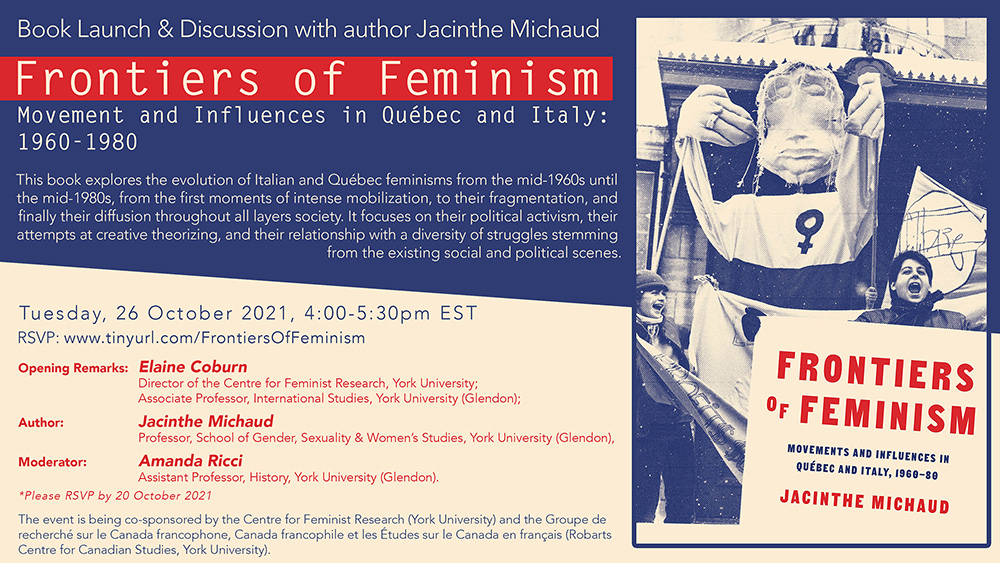
Excess: An Interdisciplinary Open Access Critical Femininities Conference
Co-Sponsored by Sexuality Studies
Date: August 19 – 22, 2021
Registration: https://yorku.zoom.us/meeting/register/tJ0vde6opj8sHdIWxdPjcMhsWv9YlA5IeLLd
The theme of the first annual York University Critical Femininities Conference is “Excess.” The conference is hosted by the Centre for Feminist Research and Sexuality Studies at York University and will take place virtually from August 19-22, 2021. We invite graduate students and emerging scholars in critical femininities, artists, and community actors to draw on critical femininities frameworks, especially intersectional approaches, to consider excess in both its disciplining and emancipatory possibilities. More details to come.
